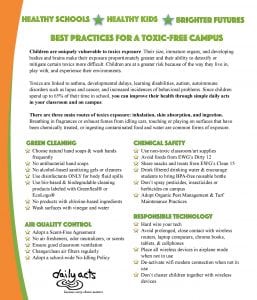HEALTHY SCHOOLS + HEALTHY KIDS + BRIGHTER FUTURE
BEST PRACTICES FOR A TOXIC-FREE CAMPUS
Children are uniquely vulnerable to toxics exposure. Their size, immature organs, and developing bodies and brains make their exposure proportionately greater and their ability to detoxify or mitigate certain toxics more difficult. Children are at a greater risk because of the way they live in, play with, and experience their environments.
Toxics are linked to asthma, developmental delays, learning disabilities, autism, autoimmune disorders such as lupus and cancer, and increased incidences of behavioral problems. Since children spend up to 65% of their time in school, you can improve their health through simple daily acts in your classroom and on campus.
There are three main routes of toxics exposure: inhalation, skin absorption, and ingestion. Breathing in fragrances or exhaust fumes from idling cars, touching or playing on surfaces that have been chemically treated, or ingesting contaminated food and water are common forms of exposure.
GREEN CLEANING
- Choose natural hand soaps & wash hands frequently
- No antibacterial hand soaps
- No alcohol-based sanitizing gels or cleaners
- Use disinfectants ONLY for body fluid spills
- Use bio-based & biodegradable cleaning products labeled with GreenSeal® or EcoLogo®
- No products with chlorine-based ingredients
- Wash surfaces with vinegar and water
AIR QUALITY CONTROL
- Adopt a Fragrance-Free Agreement
- No air fresheners, odor neutralizers, or scents
- Ensure good classroom ventilation
- Change/clean air filters regularly
- Adopt a school-wide No-Idling Policy
CHEMICAL SAFETY
- Use non-toxic classroom/art supplies
- Avoid foods from Environmental Working Group’s Dirty 12
- Share snacks and treats from Environmental Working Group’s Clean 15
- Drink filtered water & encourage students to bring BPA-free reusable bottle
- Don’t spray pesticides, insecticiedes, or herbicides on campus
- Adopt Organic Pest Management & Turf Maintenance Practices
RESPONSIBLE TECHNOLOGY
- Hard wire your tech
- Avoid prolonged, close contact with wireless routers, laptop computers, chrome books, tablets & cellphones
- Place all wireless devices in airplane mode when not in use
- De-activite wifi modem connection when not in use
- Don’t cluster children together with wireless devices



